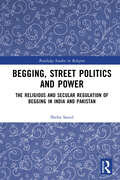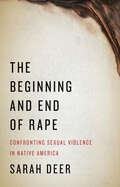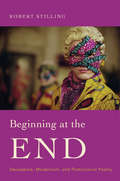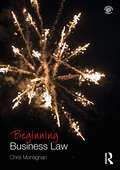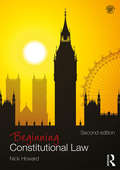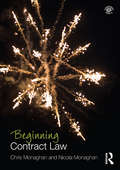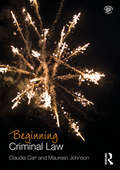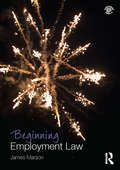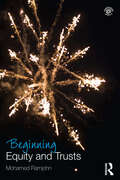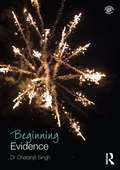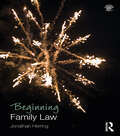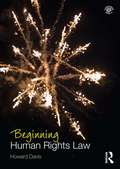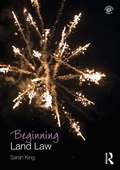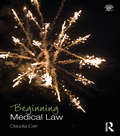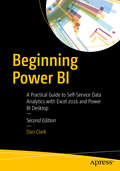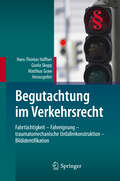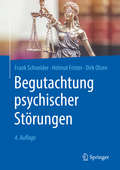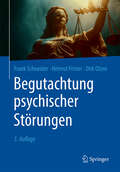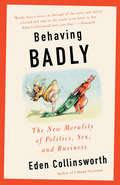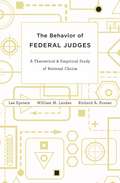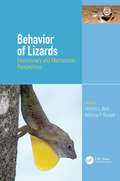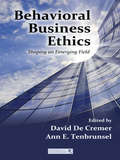- Table View
- List View
Begging, Street Politics and Power: The Religious and Secular Regulation of Begging in India and Pakistan (Routledge Studies in Religion)
by Sheba SaeedBegging, Street Politics and Power explores the complex phenomenon of begging in the context of two different religions and societies in South Asia. Focusing on India and Pakistan, the book provides an in-depth examination of the religious and secular laws regulating begging along with discussion of the power dynamics involved. Drawing on textual analysis and qualitative field research, the chapters consider the notion of charity within Hinduism and Islam, the transaction of giving and receiving, and the political structures at play in the locations studied. The book engages with the conflicting compassionate and criminal sides of begging and reveals some of the commonalities and differences in religion and society within South Asia. It will be of interest to scholars working across the fields of religious studies, social science, law and Asian studies.
The Beginning and End of Rape: Confronting Sexual Violence in Native America
by Sarah DeerWinner of the Labriola Center American Indian National Book Award Despite what major media sources say, violence against Native women is not an epidemic. An epidemic is biological and blameless. Violence against Native women is historical and political, bounded by oppression and colonial violence. This book, like all of Sarah Deer&’s work, is aimed at engaging the problem head-on—and ending it.The Beginning and End of Rape collects and expands the powerful writings in which Deer, who played a crucial role in the reauthorization of the Violence Against Women Act in 2013, has advocated for cultural and legal reforms to protect Native women from endemic sexual violence and abuse. Deer provides a clear historical overview of rape and sex trafficking in North America, paying particular attention to the gendered legacy of colonialism in tribal nations—a truth largely overlooked or minimized by Native and non-Native observers. She faces this legacy directly, articulating strategies for Native communities and tribal nations seeking redress. In a damning critique of federal law that has accommodated rape by destroying tribal legal systems, she describes how tribal self-determination efforts of the twenty-first century can be leveraged to eradicate violence against women. Her work bridges the gap between Indian law and feminist thinking by explaining how intersectional approaches are vital to addressing the rape of Native women.Grounded in historical, cultural, and legal realities, both Native and non-Native, these essays point to the possibility of actual and positive change in a world where Native women are systematically undervalued, left unprotected, and hurt. Deer draws on her extensive experiences in advocacy and activism to present specific, practical recommendations and plans of action for making the world safer for all.
Beginning at the End: Decadence, Modernism, and Postcolonial Poetry
by Robert Stilling StillingDuring the struggle for decolonization, Frantz Fanon argued that artists who mimicked European aestheticism were “beginning at the end,” skipping the inventive phase of youth for a decadence thought more typical of Europe’s declining empires. Robert Stilling takes up Fanon’s assertion to argue that decadence became a key idea in postcolonial thought, describing both the failures of revolutionary nationalism and the assertion of new cosmopolitan ideas about poetry and art. In Stilling’s account, anglophone postcolonial artists have reshaped modernist forms associated with the idea of art for art’s sake and often condemned as decadent. By reading decadent works by J. K. Huysmans, Walter Pater, Henry James, and Oscar Wilde alongside Chinua Achebe, Derek Walcott, Agha Shahid Ali, Derek Mahon, Yinka Shonibare, Wole Soyinka, and Bernardine Evaristo, Stilling shows how postcolonial artists reimagined the politics of aestheticism in the service of anticolonial critique. He also shows how fin de siècle figures such as Wilde questioned the imperial ideologies of their own era. Like their European counterparts, postcolonial artists have had to negotiate between the imaginative demands of art and the pressure to conform to a revolutionary politics seemingly inseparable from realism. Beginning at the End argues that both groups—European decadents and postcolonial artists—maintained commitments to artifice while fostering oppositional politics. It asks that we recognize what aestheticism has contributed to politically engaged postcolonial literature. At the same time, Stilling breaks down the boundaries around decadent literature, taking it outside of Europe and emphasizing the global reach of its imaginative transgressions.
Beginning Business Law (Beginning the Law)
by Chris MonaghanWhether you’re new to higher education, coming to legal study for the first time or just wondering what Business Law is all about, Beginning Business Law is the ideal introduction to help you hit the ground running. Starting with the basics and an overview of each topic, it will help you come to terms with the structure, themes and issues of the subject so that you can begin your Business Law module with confidence. Adopting a clear and simple approach with legal vocabulary explained in a detailed glossary, Chris Monaghan breaks the subject of Business Law down using practical everyday examples to make it understandable for anyone, whatever their background. Diagrams and flowcharts simplify complex issues, important cases are identified and explained and on-the- spot questions help you recognise potential issues or debates within the law so that you can contribute in classes with confidence. Beginning Business Law is an ideal first introduction to the subject for LLB, GDL or ILEX and especially international students, those enrolled on distance learning courses or on other degree programmes.
Beginning Constitutional Law (Beginning the Law)
by Nick HowardWhether you’re new to higher education, coming to legal study for the first time or just wondering what Constitutional Law is all about, Beginning Constitutional Law is the ideal introduction to help you hit the ground running. Adopting a clear and simple approach with legal vocabulary explained in a detailed glossary avaliable on the companion website, Nick Howard breaks the subject of constitutional law down using practical everyday examples to make it understandable for anyone, whatever their background. Diagrams and flowcharts simplify complex issues, important cases are identified and explained, and on-the- spot questions help you recognise potential issues or debates within the law so that you can contribute in classes with confidence. This second edition has been updated to keep up to date with developments both before and after the 2015 General Election as well as ongoing proposals for reform, including: • The referendum on independence for Scotland, increased devolved powers and the continued threat of the break-up of the Union. • Proposals to repeal the Human Rights Act 1998 and replace it with a British Bill of Rights. • The in/out referendum on EU membership. • Reform of the role and composition of the House of Lords. Beginning Constitutional Law is an ideal first introduction to the subject for LLB, GDL or ILEX and especially international students, those enrolled on distance learning courses or on other degree programmes.
Beginning Contract Law (Beginning the Law)
by Nicola Monaghan Chris MonaghanWhether you’re new to higher education, coming to legal study for the first time or just wondering what Contract Law is all about, Beginning Contract Law is the ideal introduction to help you hit the ground running. Starting with the basics and an overview of each topic, it will help you come to terms with the structure, themes and issues of the subject so that you can begin your Contract Law module with confidence. Adopting a clear and simple approach with legal vocabulary explained in a detailed glossary, Chris and Nicola Monaghan break the subject of Contract law down using practical everyday examples to make it understandable for anyone, whatever their background. Diagrams and flowcharts simplify complex issues, important cases are identified and explained and on-the- spot questions help you recognise potential issues or debates within the law so that you can contribute in classes with confidence. Beginning Contract Law is an ideal first introduction to the subject for LLB, GDL or ILEX and especially international students, those enrolled on distance learning courses or on other degree programmes.
Beginning Criminal Law (Beginning the Law)
by Maureen Johnson Claudia CarrWhether you’re new to higher education, coming to legal study for the first time or just wondering what Criminal Law is all about, Beginning Criminal Law is the ideal introduction to help you hit the ground running. Starting with the basics and an overview of each topic, it will help you come to terms with the structure, themes and issues of the subject so that you can begin your Criminal Law module with confidence. Adopting a clear and simple approach with legal vocabulary explained in a detailed glossary, Claudia Carr and Maureen Johnson break the subject of criminal law down using practical everyday examples to make it understandable for anyone, whatever their background. Diagrams and flowcharts simplify complex issues, important cases are identified and explained and on-the- spot questions help you recognise potential issues or debates within the law so that you can contribute in classes with confidence. Beginning Criminal Law is an ideal first introduction to the subject for LLB, GDL or ILEX and especially international students, those enrolled on distance learning courses or on other degree programmes.
Beginning Employment Law (Beginning the Law)
by James MarsonWhether you’re new to higher education, coming to legal study for the first time or just wondering what Employment Law is all about, Beginning Employment Law is the ideal introduction to help you hit the ground running. Starting with the basics and an overview of each topic, it will help you come to terms with the structure, themes and issues of the subject so that you can begin your Employment Law module with confidence. Adopting a clear and simple approach with legal vocabulary explained in a detailed glossary, James Marson breaks the subject of Employment Law down using practical everyday examples to make it understandable for anyone, whatever their background. Diagrams and flowcharts simplify complex issues, important cases are identified and explained and on-the- spot questions help you recognise potential issues or debates within the law so that you can contribute in classes with confidence. Beginning Employment Law is an ideal first introduction to the subject for LLB, GDL or ILEX and especially international students, those enrolled on distance learning courses or on other degree programmes.
Beginning Equity and Trusts (Beginning the Law)
by Mohamed RamjohnWhether you’re new to higher education, coming to legal study for the first time or just wondering what Equity and Trusts is all about, Beginning Equity and Trusts is the ideal introduction to help you hit the ground running. Starting with the basics and an overview of each topic, it will help you come to terms with the structure, themes and issues of the subject so that you can begin your Equity and Trusts module with confidence. Adopting a clear and simple approach with legal vocabulary explained in a detailed glossary, Mohamed Ramjohn breaks the subject of Equity and Trusts down using practical everyday examples to make it understandable for anyone, whatever their background. Diagrams and flowcharts simplify complex issues, important cases are identified and explained and on-the- spot questions help you recognise potential issues or debates within the law so that you can contribute in classes with confidence. Beginning Equity and Trusts is an ideal first introduction to the subject for LLB, GDL or ILEX and especially international students, those enrolled on distance learning courses or on other degree programmes.
Beginning Evidence (Beginning the Law)
by Charanjit SinghWhether you’re new to higher education, coming to legal study for the first time or just wondering what Evidence Law is all about, Beginning Evidence is the ideal introduction to help you hit the ground running. Starting with the basics and an overview of each topic, it will help you come to terms with the structure, themes and issues of the subject so that you can begin your evidence module with confidence. Adopting a clear and simple approach with legal vocabulary explained in a detailed glossary, Charanjit Singh Landa breaks the subject of Evidence Law down using practical everyday examples to make it understandable for anyone, whatever their background. Diagrams and flowcharts simplify complex issues, important cases are identified and explained and on-the- spot questions help you recognise potential issues or debates within the law so that you can contribute in classes with confidence. Beginning Evidence is an ideal first introduction to the subject for LLB, GDL or ILEX and especially international students, those enrolled on distance learning courses or on other degree programmes.
Beginning Family Law (Beginning the Law)
by Jonathan HerringWhether you’re new to higher education, coming to legal study for the first time or just wondering what Family Law is all about, Beginning Family Law is the ideal introduction to help you hit the ground running. Starting with the basics and an overview of each topic, it will help you come to terms with the structure, themes and issues of the subject so that you can begin your Family Law module with confidence. Adopting a clear and simple approach with legal vocabulary carefully clarified, Jonathan Herring breaks the subject of family law down using practical everyday examples to make it understandable for anyone, whatever their background. Diagrams and flowcharts simplify complex issues, important cases are identified and explained and on-the- spot questions help you recognise potential issues or debates within the law so that you can contribute in classes with confidence. Beginning Family Law is an ideal first introduction to the subject for LLB, GDL or ILEX and especially international students, those enrolled on distance learning courses or on other degree programmes. Visit the companion website: http://www.routledge.com/cw/beginningthelaw/
Beginning Human Rights Law (Beginning the Law)
by Howard DavisWhether you’re new to higher education, coming to legal study for the first time or just wondering what Human Rights Law is all about, Beginning Human Rights Law is the ideal introduction to help you hit the ground running. Starting with the basics and an overview of each topic, it will help you come to terms with the structure, themes and issues of the subject so that you can begin your Human Rights module with confidence. Adopting a clear and simple approach with legal vocabulary explained in a detailed glossary, Howard Davis breaks the subject of Human Rights Law down using practical everyday examples to make it understandable for anyone, whatever their background. Diagrams and flowcharts simplify complex issues, important cases are identified and explained and on-the- spot questions help you recognise potential issues or debates within the law so that you can contribute in classes with confidence. Beginning Human Rights Law is an ideal first introduction to the subject for LLB, GDL or ILEX and especially international students, those enrolled on distance learning courses or on other degree programmes.
Beginning Land Law (Beginning the Law)
by Sarah KingWhether you’re new to higher education, coming to legal study for the first time or just wondering what Land Law is all about, Beginning Land Law is the ideal introduction to help you hit the ground running. Starting with the basics and an overview of each topic, it will help you come to terms with the structure, themes and issues of the subject so that you can begin your Land Law module with confidence. Adopting a clear and simple approach with legal vocabulary explained in a detailed glossary, Sarah King breaks the subject of Land Law down using practical everyday examples to make it understandable for anyone, whatever their background. Diagrams and flowcharts simplify complex issues, important cases are identified and explained and on-the- spot questions help you recognise potential issues or debates within the law so that you can contribute in classes with confidence. Beginning Land Law is an ideal first introduction to the subject for LLB, GDL or ILEX and especially international students, those enrolled on distance learning courses or on other degree programmes.
Beginning Medical Law (Beginning the Law)
by Claudia CarrWhether you’re new to higher education, coming to legal study for the first time or just wondering what Medical Law is all about, Beginning Medical Law is the ideal introduction to help you hit the ground running. Starting with the basics and an overview of each topic, it will help you come to terms with the structure, themes and issues of the subject so that you can begin your Medical Law module with confidence. Adopting a clear and simple approach with legal vocabulary carefully clarified, Claudia Carr breaks the subject of Medical Law down using practical everyday examples to make it understandable for anyone, whatever their background. Diagrams and flowcharts simplify complex issues, important cases are identified and explained and on-the- spot questions help you recognise potential issues or debates within the law so that you can contribute in classes with confidence. Beginning Medical Law is an ideal first introduction to the subject for LLB, GDL or ILEX and especially international students, those enrolled on distance learning courses or on other degree programmes.
Beginning Power BI: A Practical Guide to Self-Service Data Analytics with Excel 2016 and Power BI Desktop
by Dan ClarkAnalyze your company's data quickly and easily using Microsoft's latest tools. You will learn to build scalable and robust data models to work from, clean and combine different data sources effectively, and create compelling visualizations and share them with your colleagues. Author Dan Clark takes you through each topic using step-by-step activities and plenty of screen shots to help familiarize you with the tools. This second edition includes new material on advanced uses of Power Query, along with the latest user guidance on the evolving Power BI platform. Beginning Power BI is your hands-on guide to quick, reliable, and valuable data insight. What You'll Learn Simplify data discovery, association, and cleansing Build solid analytical data models Create robust interactive data presentations Combine analytical and geographic data in map-based visualizations Publish and share dashboards and reports Who This Book Is For Business analysts, database administrators, developers, and other professionals looking to better understand and communicate with data
The Beginnings of English Law
by Lisi OliverThe laws of Æthelbert of Kent (ca. 600), Hlohere and Eadric (685x686), and Wihtred (695), are the earliest laws from Anglo-Saxon England, and the first Germanic laws written in the vernacular. They are of unique importance as the only extant early medieval English laws that delineate the progress of law and legal language in the early days of the conversion to Christianity. Æthelbert's laws, the closest existing equivalent to Germanic law as it was transmitted in a pre-literate period, contrast with Hlohere and Eadric's expanded laws, which concentrate on legal procedure and process, and again contrast with the further changed laws of Wihtred which demonstrate how the new religion of Christianity adapted and changed the law to conform to changing social mores.This volume updates previous works with current scholarship in the fields of linguistics and social and legal history to present new editions and translations of these three Kentish pre-Alfredian laws. Each body of law is situated within its historical, literary, and legal context, annotated, and provided with facing-page translation.
Begleitung von Flüchtlingen mit traumatischen Erfahrungen
by Ulrike Imm-Bazlen Anne-Kathrin SchmiegDieses Buch bietet Ihnen das nötige Grundlagenwissen zur Begleitung von traumatisierten Menschen und das Wissen um Methoden, die auch bei geringen Deutschkenntnissen angewendet werden können. Unter anderem werden darin folgende Fragen beantwortet: Was ist ein Trauma? Wie entsteht es? Wie kann es erkannt werden? Welche Schicksale verbergen sich hinter der Bezeichnung "Flüchtling" bzw. "Flüchtling mit traumatischen Erfahrungen"? Im Mittelpunkt dieses Buches stehen Menschen: der (traumatisierte) Flüchtling und Sie als sein Begleiter. Dabei beeinflussen Sie sich gegenseitig. Entsprechend wichtig ist die Frage, wen der Flüchtling sieht. Was bringen Sie bewusst oder unbewusst in die Begleitung ein? Und so kann es in mehrfacher Hinsicht ein absolut spannendes Buch für Sie werden, das weit über die Vermittlung von Grundlagenwissen hinaus geht. Es lädt Sie auch zu einer Entdeckungsreise zu sich selbst ein. Aber schauen Sie selbst. . .
Begutachtung im Verkehrsrecht: Fahrtüchtigkeit - Fahreignung - traumatomechanische Unfallrekonstruktion - Bildidentifikation
by Matthias Graw Gisela Skopp Hans-Thomas HaffnerDie Aufgabe des Gutachters im Gerichtsverfahren ist es, Juristen die Fachkenntnisse zu vermitteln, die für die Beurteilung eines Sachverhalts notwendig sind. Um diesen Vermittlungsprozess im Bereich der Verkehrsmedizin zu unterstützen, haben die Autoren das wissenschaftliche Basiswissen verständlich aufbereitet - von der forensischen Toxikologie über die biomechanische Unfallrekonstruktion bis zur anthropologischen Bildidentifikation. Sie zeigen die Möglichkeiten und Grenzen der Begutachtung auf und illustrieren dies anhand konkreter Fallbeispiele.
Begutachtung psychischer Störungen
by Frank Schneider Helmut Frister Dirk OlzenBegutachtungen von Menschen mit psychischen Störungen sind anspruchsvoll und gelten als schwierig. Das vorliegende Standardwerk bietet deshalb einen kompakten und gleichzeitig praxisnahen Leitfaden für ärztliche und psychologische Sachverständige, aber auch eine unverzichtbare und umfassende Grundlage für Juristen. Denn richtige und faire Entscheidungen der Gerichte können nur gefällt werden, wenn sich Mediziner, Psychologen und Juristen untereinander verständigen können. Dieses Buch leistet einen wesentlichen Beitrag zu diesem nicht immer einfachen, aber notwendigen und nicht zuletzt besonders interessanten und spannenden interdisziplinären Austausch. Das Werk zeichnet sich aus durch eine praxisbezogene, verständliche und klare Darstellung der wesentlichen Aspekte der psychiatrischen und psychologischen Begutachtung, ausführliche Beispielgutachten sowie zahlreiche Fallbeispiele aus der Praxis viele Tipps zum Erstellen eines Gutachtens die Darstellung des aktuellen Stands der medizinischen, psychologischen und juristischen Literatur, inklusive der neuesten Rechtsprechung und Gesetzgebung. Mit der nun vorliegenden vierten Auflage wurde das Werk zudem grundlegend aktualisiert. Das Buch ist ein wertvoller Begleiter für Mediziner, Psychologen, Juristen und alle anderen Interessierten, die mit psychiatrischen und psychologischen Gutachten zu tun haben.
Begutachtung psychischer Störungen
by Frank Schneider Helmut Frister Dirk OlzenBegutachtungen von Menschen mit psychischen Störungen sind anspruchsvoll und gelten als schwierig. Das vorliegende Standardwerk bietet deshalb einen kompakten und gleichzeitig praxisnahen Leitfaden für ärztliche und psychologische Sachverständige, aber auch eine unverzichtbare und umfassende Grundlage für Juristen. Denn richtige und faire Entscheidungen der Gerichte können nur gefällt werden, wenn sich Mediziner, Psychologen und Juristen untereinander verständigen können. Dieses Buch leistet einen wesentlichen Beitrag zu diesem nicht immer einfachen, aber notwendigen und nicht zuletzt besonders interessanten und spannenden interdisziplinären Austausch. Das Werk zeichnet sich aus durch eine praxisbezogene, verständliche und klare Darstellung der wesentlichen Aspekte der psychiatrischen und psychologischen Begutachtung, ausführliche Beispielgutachten sowie zahlreiche Fallbeispiele aus der Praxis viele Tipps zum Erstellen eines Gutachtens die Darstellung des aktuellen Stands der medizinischen, psychologischen und juristischen Literatur, inklusive der neuesten Rechtsprechung und Gesetzgebung. Das Buch ist ein wertvoller Begleiter für Mediziner, Psychologen, Juristen und alle anderen Interessierten, die mit psychiatrischen und psychologischen Gutachten zu tun haben. Mit der fünften Auflage wurde es erneut überarbeitet und aktualisiert. So wird beispielsweise bereits Bezug genommen auf die künftige ICD-11-Klassifikation, es werden aktuelle gesetzliche Änderungen, z.B. im Betreuungsrecht und bei der Behandlung von Kindern mit Varianten der Geschlechtsentwicklung (§ 1631e BGB), das neue 14. Buch des Sozialgesetzbuches, das neue Strafrechtsbezogene Unterbringungsgesetz NRW, die geänderten Voraussetzungen für die Unterbringung in einer Entziehungsanstalt (§ 64 StGB) sowie geänderte juristische Terminologien und aktuelle Literatur berücksichtigt.
Behandlungsfehler und Haftpflicht in der Viszeralchirurgie
by Hans-Peter Bruch Jörg Heberer Joachim Jähne Jürgen BauchDie Vermeidung von Behandlungsfehlern und der Umgang mit haftungsrechtlichen Konsequenzen ist für Chirurgen ein Thema von wachsender Bedeutung. In dem Band werden die rechtlichen Grundlagen, Verhaltensregeln und Verfahren der rechtlichen Klärung für die Viszeralchirurgie umfassend aufgearbeitet. Renommierte Kliniker beschreiben mögliche Behandlungsfehler, liefern Hinweise zur Fehlervermeidung und zeigen die rechtlichen Konsequenzen auf. Dabei werden sowohl konventionelle Operationsverfahren als auch die minimal invasive Chirurgie berücksichtigt.
Behaving Badly: The New Morality in Politics, Sex, and Business
by Eden CollinsworthWhat is the relevance of morality today? Eden Collinsworth enlists the famous, the infamous, and the heretofore unheard-of to unravel how we make moral choices in an increasingly complex—and ethically flexible—age. To call these unsettling times is an understatement: our political leaders are less and less respectable; in the realm of business, cheating, lying, and stealing are hazily defined; and in daily life, rapidly changing technology offers permission to act in ways inconceivable without it. Yet somehow, this hasn’t quite led to a complete free-for-all—people still draw lines around what is acceptable and what is not. Collinsworth sets out to understand how and why. In her intrepid quest, she squares off with a prime minister, the editor of London’s Financial Times, a holocaust survivor, a pop star, and a former commander of the U.S. Air Force to grapple with the impracticality of applying morals to foreign policy; precisely when morality gets lost in the making of money; what happens to morality without free will; whether “immoral” women are just those having a better time; why celebrities have become the new moral standard-bearers; and if testosterone is morality’s enemy or its hero.
The Behavior of Federal Judges: A Theoretical and Empirical Study of Rational Choice
by Lee Epstein William M. Landes Richard A. PosnerJudges play a central role in the American legal system, but their behavior as decision makers is not well understood, even among themselves. The system permits judges to be quite secretive (and most of them are), so indirect methods are required to make sense of their behavior. Here, a political scientist, an economist, and a judge work together to construct a unified theory of judicial decision-making. Using statistical methods to test hypotheses, they dispel the mystery of how judicial decisions in district courts, circuit courts, and the Supreme Court are made. The authors derive their hypotheses from a labor-market model, which allows them to consider judges as they would any other economic actors: as self-interested individuals motivated by both the pecuniary and non-pecuniary aspects of their work. In their view, this model describes judicial behavior better than either the traditional “legalist” theory, which sees judges as automatons who mechanically apply the law to the facts, or the current dominant theory in political science, which exaggerates the ideological component in judicial behavior. Ideology does figure into decision-making at all levels of the federal judiciary, the authors find, but its influence is not uniform. It diminishes as one moves down the judicial hierarchy from the Supreme Court to the courts of appeals to the district courts. As The Behavior of Federal Judges demonstrates, the good news is that ideology does not extinguish the influence of other components in judicial decision-making. Federal judges are not just robots or politicians in robes.
Behavior of Lizards: Evolutionary and Mechanistic Perspectives
by Vincent Bels Anthony RussellKey features: Presents a contemporary snapshot of the mechanisms underlying the evolution and adaptation of behavior Explores how genetics, epigenetics, development, and environment shape behavior Discusses a broad range of behavioral repertoires and responses, including those related to thermoregulatory, foraging, predatory, displaying, social and escape strategies. Examines physiological and sensory mechanisms Covers the effects of various aspects of global change on behavior, with chapters that focus on the impacts of climate change on hydroregulatory behavior and behavioral responses to the effects of habitat alteration resulting from human-mediated change and colonization by invasive species. Lizards serve as focal organisms for many of biological questions related to evolution, ecology, physiology, and morphology. They are studied at multiple spatial and temporal scales, from the individual to the community level. This book, authored by expert contributors from around the world, explores behaviors underlying the evolution and adaptation of these organisms. It covers conceptual, empirical, and methodological approaches to the understanding of the role that natural and sexual selection play in molding the behavioral traits of lizards. This thorough, illustrated reference should stimulate discussion of the conceptual and methodological approaches for studying the behavioral traits of these fascinating and highly diverse vertebrates.
Behavioral Business Ethics: Shaping an Emerging Field (Organization and Management Series)
by David De Cremer Ann E. TenbrunselThis book takes a look at how and why individuals display unethical behavior. It emphasizes the actual behavior of individuals rather than the specific business practices. It draws from work on psychology which is the scientific study of human behavior and thought processes. As Max Bazerman said, "efforts to improve ethical decision making are better aimed at understanding our psychological tendencies."
